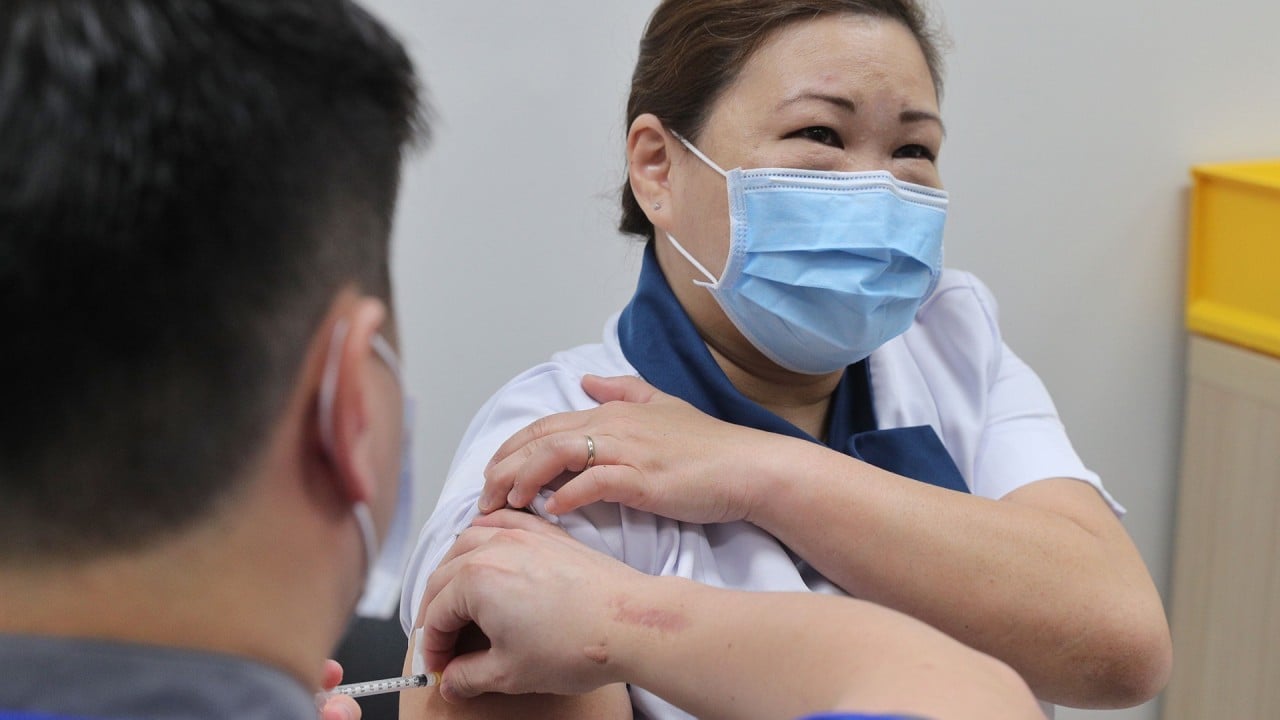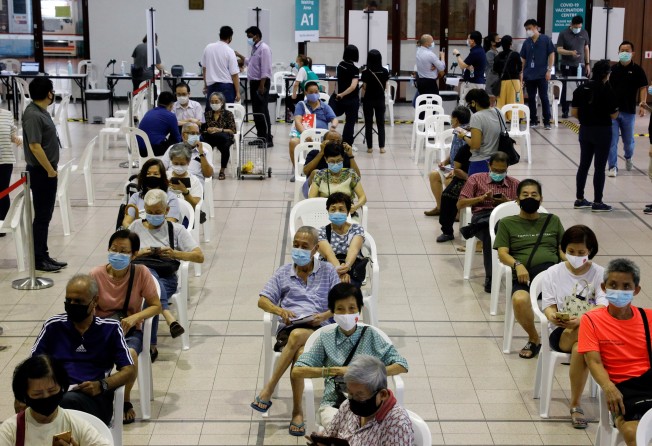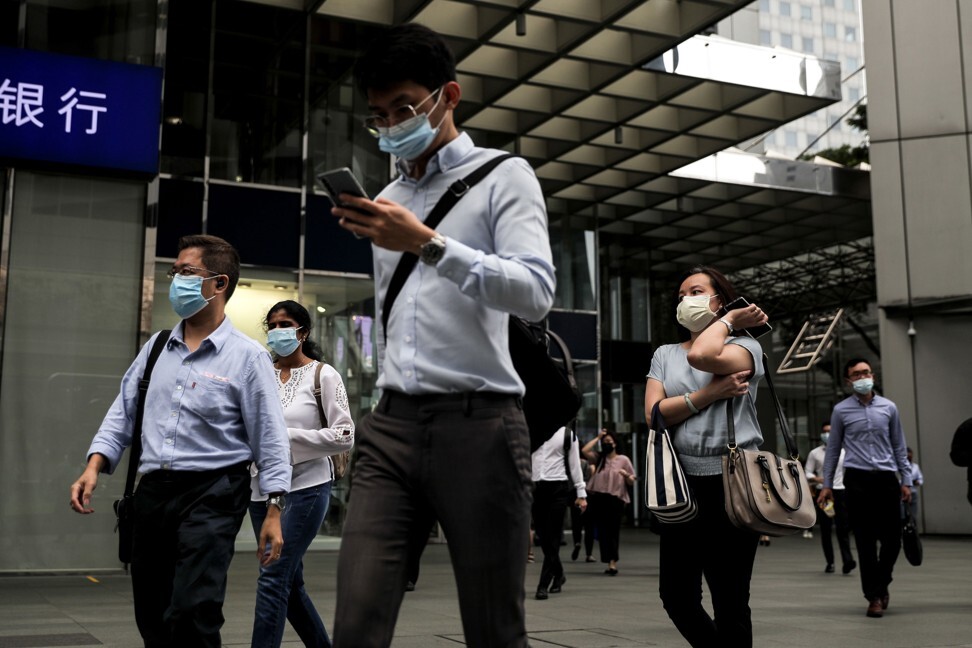
02:03
Singapore begins national Covid-19 vaccination programme

When the Pfizer-BioNTech coronavirus vaccines arrived in Singapore in December, the moment was cheered by residents and politicians alike. Transport Minister Ong Ye Kung received the shipment with much fanfare and oversaw its delivery to a cold-chain warehouse, while Prime Minister Lee Hsien Loong called the arrival of the vaccines a “welcome present that we’ve all been looking forward to”.
It was a similar story two months later, when the city state received its first batch of Moderna shots. Lee said he was “pleased” with the delivery, and reporters were forwarded a series of photographs showing the bulky vaccine boxes with a Singapore Airlines plane in the background.
Yet there was no such fanfare to greet the arrival of the China-made Sinovac shots on Tuesday evening. Rather, the seemingly played-down event was only made known a day later by the Chinese embassy.
Singapore’s Ministry of Health later confirmed that the Sinovac jabs had arrived but stressed that the vaccine has not yet been authorised by regulators and so cannot be used immediately, unlike the Pfizer and Moderna shots.
Analysts said the uncertainty surrounding the Sinovac jabs likely contributed to the stark contrast in reactions, while suggesting that there could be unstated diplomatic pressure on Singapore to approve the vaccine.
Leong Hoe Nam, an infectious diseases expert, noted it was “unusual” that the vaccines had arrived before authorisation was granted.
A vaccine shipment that arrives before authorisation could face a host of challenges, he said, including the risk the vaccines could expire before they are officially approved, although reports said the Sinovac vaccine has a refrigerated shelf life of three years.

02:03
Singapore begins national Covid-19 vaccination programme
He questioned why China had sent the jabs, remarking that “It‘s almost like they are begging Singapore to use” them.
Singapore had hammered out an advance agreement with Sinovac on the vaccine, although no details about the scheduled delivery date were revealed.
Khor Swee Kheng, a Malaysian specialist in health policies, said countries that receive vaccines before regulatory approval face concerns about the possibility of “regulatory limbo” and the risk of political pressure on regulatory authorities to approve the vaccine shipments.
He said that countries around the world are struggling to balance the speed of regulatory approvals and expiring agreements with pharmaceutical firms, and suggested that if regulatory approval is too slow in one country, then another country that has already approved a particular vaccine could exercise its “contractual right” and purchase the vaccines from the former.
Singapore‘s Ministry of Health said Wednesday that Sinovac has started submitting initial data on the efficacy of the vaccine to the ministry’s Health Sciences Authority. But Leong said there was no time frame for the process, and likened the approval of a vaccine without the needed data to back it up to endorsing the fiscal health of a company with no financial statements.
“Only when all factors are met will the approval go through,” Leong said.
Chong Ja Ian, a political scientist and scholar of Chinese foreign policy at the National University of Singapore, said Beijing was eager to see the international adoption of its vaccines as part of its so-called vaccine diplomacy. He said the Tuesday shipment to the city state was part of the campaign.
Chong said there was a chance that Beijing could be “unhappy” if Singapore does not – or is slow – in approving the Sinovac vaccine, given its eagerness to showcase its capabilities.
“However, the core consideration during this time of crisis should be [the vaccine’s] safety and effectiveness … rather than whether particular governments or leaders are happy or not,” he added. “Any focus other than public health at this moment of crisis is irresponsible.”
The Chinese embassy in Singapore lauded the vaccine shipment as having added a “new highlight” to the 30 years of Sino-Singapore ties. It wrote on Facebook that it believed the vaccine would contribute to Singapore’s virus efforts, and that Beijing would continue to work with the city state to “win the final victory” against the pandemic.
Given Singapore’s reputation for standards, Chong said, its authorisation of the Sinovac vaccine would be seen as a seal of approval for all China-developed vaccines.
Victor Shih, an associate professor of political economy at the University of California San Diego, concurred that Singapore’s approval would lend credence to the idea that Chinese vaccines are globally accepted, noting that these vaccines have mostly been used in developing countries, including Indonesia and the Philippines.
Singapore is among the few wealthy countries that are considering the use of Chinese vaccines, alongside the United Arab Emirates.
Shih said, however, that the main audience for Beijing’s vaccine diplomacy was a domestic one.

“When China rolls out a mass vaccination campaign domestically, the government wants Chinese citizens to accept the Chinese vaccines, despite their lower efficacy compared to leading Western vaccines,” he said.
Trial data shows Sinovac having an efficacy rate of about 50.4 per cent, compared with the Pfizer-BioNTech vaccine’s 95 per cent and Moderna’s 94 per cent efficacy rates.
Shih said that there could be “some pressure applied behind the scenes” for Singapore to approve the Sinovac jab, but added that even if it is approved there would likely be “few users” in the city state given the supplies of the Pfizer-BioNTech and Moderna vaccines.
The Singapore government has not disclosed how many doses of each vaccine it has, and said residents would not get to choose the shots they receive. Authorities said about 250,000 residents had received their first jabs as of last Thursday, and that over 110,000 had been inoculated twice, with vaccinations of elderly residents well under way.
Meanwhile, Zha Daojiong, a professor at Peking University’s School of International Studies, stressed that the decision made by the Singapore health regulatory authority on approving the Sinovac vaccine would be one based on scientific rigour “rather than diplomatic or political goodwill”.
He noted that the Sinovac vaccine has been through rounds of scientific and policy tests in different countries, and that talk of China pushing hard for a country to adopt its vaccine was “difficult to substantiate”.
“I don’t see an impact … in any political and diplomatic sense that comes with an eventual decision by Singapore,” Zha said.
“It would be very unwise for China’s agencies of diplomacy to appear [to be] pressuring any government to make a positive decision about Chinese vaccines and for any government to make a decision on political goodwill.”